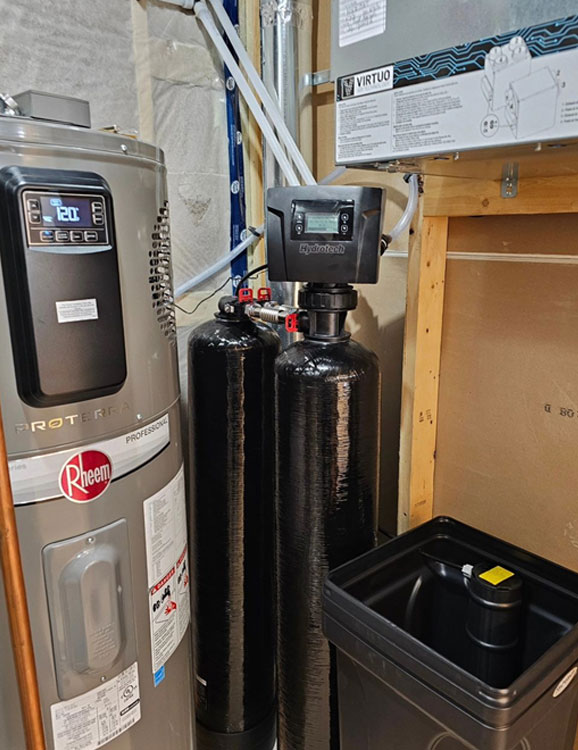Water Softener Systems
- Home
- Water Softener Systems
Water Softeners – Solutions for Softer, Cleaner Water
A water softener removes minerals that create water hardness, one of the most common water quality problems in Saskatchewan. Hard water destroys appliances, leaves filmy soap scum across bathrooms and kitchens, and dries out hair and skin. With over 85% of the Canadian States relying on hard water for their cooking, cleaning, and bathing, water softeners serve a vital purpose in protecting the home’s plumbing and appliances. A water softener saves you from replacing prematurely ruined water heaters, scaly faucet heads, and hours and hours of cleaning up soapy residue. Investing in a water softener saves you time, energy, and money while protecting your home and property.
What is a Water Softener?
A water softener is a whole-house water treatment system that removes hardness-causing calcium and magnesium minerals from your water through a process called ion exchange. A water softener addresses hard water, one of the most prevalent and devastating water problems. Hard water wreaks havoc on a home’s plumbing and appliances, clogging pipes and shortening the lifespan of dishwashers, coffee makers, and ice machines.
The higher the temperature of the water, the more calcium and magnesium will solidify and harden into solid deposits inside your hot water heater. If you live in hard water territory, your water heater may sound like it is popping popcorn. This is because scale has attached itself to the heating element. As the temperature of the heater rises and the tank expands, the calcified rock deposits crusted on the heating elements start cracking and stretching.
Without a water softener, laundry demands extra detergent to prevent it from looking dingy. Dishes will come out of your dishwasher streaked and stained. Filmy scum builds up on your shower curtains, and your soap and shampoo will not lather. Bathing in hard water leaves your skin itchy and dry and your hair lifeless and sticky. The amount of time, energy, and money required to clean up the detrimental side effects of hard water can be overwhelming. A whole house water softener is the solution to the many problems hard water introduces to a home.
Water Softeners Benefits
Water softeners are superior to other forms of water treatment systems in the following ways.
Effectively soften water
Water softeners are the only systems that can reliably and efficiently deliver soft water to your whole home. While salt-free water softeners can mitigate some effects of hard water, they do not actually soften water, leaving you with dry skin, streaky dishes, and brittle hair.
Protect appliances
Water softeners prevent damage to appliances caused by limescale buildup. The effects on water heaters are particularly terrible, as heating elements coated in scale must work harder to heat water. As appliances are exposed to scale, their lifespans decrease, forcing you to replace them sooner than you would typically need to. A water softener is not just a water treatment system, it is an investment in your home’s health.
Enhance cleaning
Hard water prevents soap from lathering and leaves you with itchy skin and brittle hair. When water is treated by a softener, these effects are no longer an issue. Soft water allows you to use less soap and detergent when you clean your dishes, laundry, and yourself.
Lasts over a decade
Water softeners can last as long as 20 years, but the average lifespan is 15 years. If the system is properly installed and maintained, you will only need to worry about restocking the salt supply for the system. When compared to the cost of prematurely replacing appliances because of damage caused by scale, the initial and upkeep costs of a water softener are a worthwhile investment.

Why Choose Valley Water Softeners?
Superior Softening
Long-Term Protection
Custom Solutions
Professional Installation and Maintenance
Contact Us Today
FAQs on Water Softener Systems
Q1. Is soft water safe to drink?
A: Yes, soft water is safe to drink. During the ion exchange process, the resin beads release sodium into the water when grabbing ahold of the hardness minerals, but the amount of sodium in softened water is not unhealthy and is actually far less than what is widely imagined.
Q2. Do I need a water softener?
A: You need a water softener if you live with decreased pressure from scale-ridden pipes or suffer from dry hair, stiff laundry, and endless appliance repair bills. Hard water is not a problem that will go away on its own, and the costs incurred by hard water will only continue to escalate. Without a water softener, appliances will inevitably fail sooner than their expected lifespan. If scale continues to accumulate in your pipes, your flow rate will continue to decrease, and you risk losing water pressure throughout the house.
Q3. What do water softeners remove?
A: Water softeners are designed to remove calcium and magnesium ions from hard water. Calcium (Ca2+) and magnesium (Mg2+) are the two water hardness-causing minerals. The ion exchange process will furthermore attract and eliminate any positively charged ions (also known as cations). These include other minerals like iron and manganese.
Q4. How does water softener regeneration work?
A: Water softener regeneration cycles flood the resin beads with a highly concentrated brine solution, washing off the hardness minerals and draining them out of the system. The resin beads are recharged and primed to continue eliminating the hardness minerals. Resin beads are extremely durable and can effectively soften your water for twenty years or longer. Water softeners regenerate by one of two methods: co-current (downflow brining) or counter-current regeneration (upflow brining).
Popular Searches
Water softeners system | Water softeners installed | Water Softeners whole house | Water softeners benefits | Water Softeners for home | Water Softeners types

